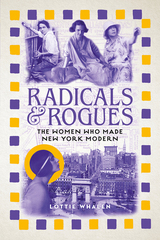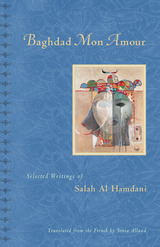
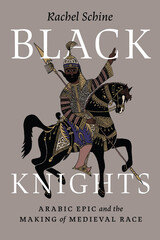
In Black Knights, Rachel Schine reveals how the Arabic-speaking world developed a different form of racial knowledge than their European neighbors during the Middle Ages. Unlike in European vernaculars, Arabic-language ideas about ethnic difference emerged from conversations extending beyond the Mediterranean, from the Sahara to the Indian Ocean. In these discourses, Schine argues, Blackness became central to ideas about a global, ethnically inclusive Muslim world.
Schine traces the emergence of these new racial logics through popular Islamic epics, drawing on legal, medical, and religious literatures from the period to excavate a diverse and ever-changing conception of Blackness and race. The result is a theoretically nuanced case for the existence and malleability of racial logics in premodern Islamic contexts across a variety of social and literary formations.
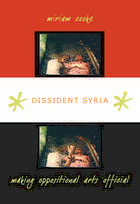
A renowned scholar of Arab cultures, cooke spent six months in Syria during the mid-1990s familiarizing herself with the country’s literary scene, particularly its women writers. While she was in Damascus, dissidents told her that to really understand life under Hafiz Asad, she had to speak with playwrights, filmmakers, and, above all, the authors of “prison literature.” She shares what she learned in Dissident Syria. She describes touring a sculptor’s studio, looking at the artist’s subversive work as well as at pieces commissioned by the government. She relates a playwright’s view that theater is unique in its ability to stage protest through innuendo and gesture. Turning to film, she shares filmmakers’ experiences of making movies that are praised abroad but rarely if ever screened at home. Filled with the voices of writers and artists, Dissident Syria reveals a community of conscience within Syria to those beyond its borders.
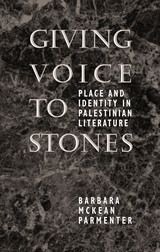
"A struggle between two memories" is how Palestinian poet Mahmud Darwish describes the conflict between Palestinians and Israelis. Within this struggle, the meanings of land and home have been challenged and questioned, so that even heaps of stones become points of contention. Are they proof of ancient Hebrew settlement, or rubble from a bulldozed Palestinian village? The memory of these stones, and of the land itself, is nurtured and maintained in Palestinian writing and other modes of expression, which are used to confront and counter Israeli images and rhetoric. This struggle provides a rich vein of thought about the nature of human experience of place and the political uses to which these experiences are put.
In this book, Barbara McKean Parmenter explores the roots of Western and Zionist images of Palestine, then draws upon the work of Darwish, Ghassan Kanafani, and other writers to trace how Palestinians have represented their experience of home and exile since the First World War. This unique blending of cultural geography and literary analysis opens an unusual window on the struggle between these two peoples over a land that both divides them and brings them together.

Islamicate Sexualities: Translations across Temporal Geographies of Desire explores different genealogies of sexuality and questions some of the theoretical emphases and epistemic assumptions affecting current histories of sexuality. Concerned with the dynamic interplay between cultural constructions of gender and sexuality, the anthology moves across disciplinary fields, integrating literary criticism with social and cultural history, and establishes a dialogue between historians (Kathryn Babayan, Frédéric Lagrange, Afsaneh Najmabadi, and Everett Rowson), comparative literary scholars (Sahar Amer and Leyla Rouhi), and critical theorists of sexualities (Valerie Traub, Brad Epps, and Dina al-Kassim).
As a whole, the anthology challenges Middle Eastern Studies with questions that have arisen in recent studies of sexualities, bringing into conversation Euro-American scholarship of sexuality with that of scholars engaged in studies of sexualities across a vast cultural (Iberian, Arabic, and Iranian) and temporal field (from the tenth century to the medieval and the modern).
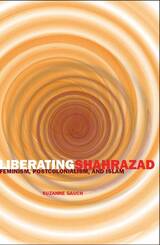
In Liberating Shahrazad, Suzanne Gauch analyzes how postcolonial writers and filmmakers from Algeria, Morocco, and Tunisia have reclaimed the storyteller in order to portray Muslim women in ways that highlight their power to shape their own destinies. Gauch looks at Maghrebian works that incorporate Shahrazad’s storytelling techniques into unexpected and unforeseen narratives. Highlighting the fluid nature of storytelling, Gauch demonstrates how these new depictions of Shahrazad—from artists such as Moufida Tlatli, Fatima Mernissi, Tahar Ben Jelloun, Assia Djebar, Leïla Sebbar—navigate the demands of a global marketplace, even as they reshape the stories told about the Islamic world.
In the face of both rising fundamentalism and proliferating Western media representations of Arab and Muslim women as silent, exploited, and uneducated victims, Gauch establishes how contemporary works of literature and film revive the voice of a long-silenced Shahrazad—and, ultimately, overthrow oppressive images of Muslim women. Suzanne Gauch is assistant professor of English and women’s studies at Temple University.
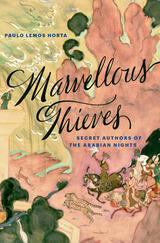
Although many of its stories originated centuries ago in the Middle East, the Arabian Nights is regarded as a classic of world literature by virtue of the seminal French and English translations produced in the eighteenth and nineteenth centuries. Supporting the suspicion that the story collection is more Parisian than Persian, some of its most famous tales, including the stories of Aladdin and Ali Baba, appear nowhere in the original sources. Yet as befits a world where magic lamps may conceal a jinni and fabulous treasures lie just beyond secret doors, the truth of the Arabian Nights is richer than standard criticism suggests.
“Marvellous Thieves, which draws on hitherto neglected sources, is a brilliant, fluent and original work of literary scholarship.”
—Robert Irwin, Literary Review
“This fine book…cogently probes an influential period in the knotted and at times sordid history of the Arabian Nights, serving as a fine example to those unraveling this promiscuous and forever malleable set of stories.”
—Charles Shafaieh, Wall Street Journal
“Intelligent and engrossing…The great merit of Horta’s book is that its interest always lies in the story of the story, in mapping out the complex network of the translators, editors and travellers behind the Arabian Nights, in ways that enrich our sense of this remarkable text.”
—Shahidha Bari, Times Higher Education

In this succinct introduction to modern Arabic literature of the nineteenth and twentieth centuries, Paul Starkey traces its development from the medieval Arabic literary tradition—beginning in the sixth-century with nomadic Bedouin poetry and the Qur'an—through new literary forms adapted from Western imaginative literature. He explores the interaction between social, political, and cultural change in the Middle East and northern Africa and the development of a modern Arabic literary tradition.
From the early nineteenth century through World War I, the Western genres of poetry, the novel, short story, and drama reached various parts of the Arabic-speaking world. Starkey discusses the resultant evolution of Arabic literature in separate sections on poetry, prose writing, and the theatre in Egypt, the Levant, Iraq, and northern Africa, from early contact through the emergence of women's literary voices in the 1960s to contemporary writers.
Arabic terms are presented in transcription, and an extensive bibliography provides suggestions for further reading. Modern Arabic Literature is the perfect introduction for readers interested in the contemporary Middle East or in comparative, colonial, world, or modern literature.
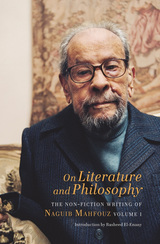
As these pieces show, Mahfouz was deeply interested in literature and philosophy, and his early writings engage with the origins of philosophy, its development and place in the history of thought, as well its meaning writ large. In his literary essays, he discusses a wide range of authors, from Anton Chekov to his own Arab contemporaries like Taha Hussein. He also ventures into a host of important contemporary issues, including science and modernity, the growing movement for women’s rights in the Arab world, and emerging ideologies like socialism—all of which outline the growing challenges to traditional modes of living that we saw all around him.
Together, these essays offer a fascinating window not just into the mind of Mahfouz himself but the changing landscape of Egypt during that time, from the development of Islam to the struggles between tradition, modernity, and the influences of the West.
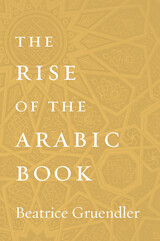
The little-known story of the sophisticated and vibrant Arabic book culture that flourished during the Middle Ages.
During the thirteenth century, Europe’s largest library owned fewer than 2,000 volumes. Libraries in the Arab world at the time had exponentially larger collections. Five libraries in Baghdad alone held between 200,000 and 1,000,000 books each, including multiple copies of standard works so that their many patrons could enjoy simultaneous access.
How did the Arabic codex become so popular during the Middle Ages, even as the well-established form languished in Europe? Beatrice Gruendler’s The Rise of the Arabic Book answers this question through in-depth stories of bookmakers and book collectors, stationers and librarians, scholars and poets of the ninth century.
The history of the book has been written with an outsize focus on Europe. The role books played in shaping the great literary cultures of the world beyond the West has been less known—until now. An internationally renowned expert in classical Arabic literature, Gruendler corrects this oversight and takes us into the rich literary milieu of early Arabic letters.

The Study of al-Andalus is a collection of essays by students and colleagues of James T. Monroe, Professor Emeritus of Comparative Literature and Arabic at the University of California, Berkeley, and the premier scholar of Andalusi (Hispano-Arabic) literature in the United States. The introduction by the editors explains the impact Monroe’s scholarship has had on the fields of Arabic, Spanish, and comparative literatures.
The first essay in the collection explains the impact of Monroe’s watershed study Islam and Arabs in Spanish Scholarship (1971). The ten essays that follow explore the many ways in which Monroe’s scholarship has inspired further study in topics including Hispano-Arabic, Hebrew, and Romance literatures; Persian epic poetry; the impact of Andalusi literature in Egypt and the Arab East; and the lasting legacy of the expulsion of Spain’s last Muslims (the Moriscos) in the Early Modern and Modern Arab world.
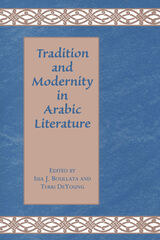

In 2003, Lebanese writer Rashid al-Daif spent several weeks in Germany as part of the “West-East Divan” program, a cultural exchange effort meant to improve mutual awareness of German and Middle Eastern cultures. He was paired with German author Joachim Helfer, who then returned the visit to al-Daif in Lebanon. Following their time together, al-Daif published in Arabic a literary reportage of his encounter with Helfer in which he focuses on the German writer’s homosexuality. His frank observations have been variously read as trenchant, naïve, or offensive. In response, Helfer provided an equally frank point-by-point riposte to al-Daif’s text. Together these writers offer a rare exploration of attitudes toward sex, love, and gender across cultural lines. By stretching the limits of both fiction and essay, they highlight the importance of literary sensitivity in understanding the Other.
Rashid al-Daif’s “novelized biography” and Joachim Helfer’s commentary appear for the first time in English translation in What Makes a Man? Sex Talk in Beirut and Berlin. Also included in this volume are essays by specialists in Arabic and German literature that shed light on the discourse around sex between these two authors from different cultural contexts.
READERS
Browse our collection.
PUBLISHERS
See BiblioVault's publisher services.
STUDENT SERVICES
Files for college accessibility offices.
UChicago Accessibility Resources
home | accessibility | search | about | contact us
BiblioVault ® 2001 - 2024
The University of Chicago Press





